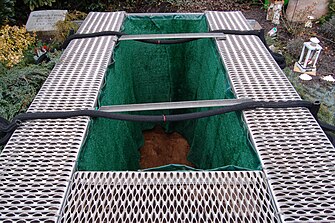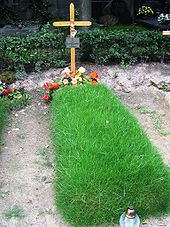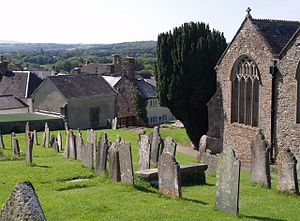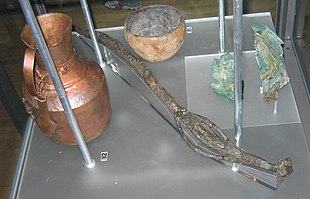<nowiki>sepultura; 墳墓; могила; gröf; 坟墓; قبر; grav; kubur; 坟墓; habung; haud; موگىيلا; هديره; гроб; a̱bi; mezar; قبر; túmulo; hauta; grav; mogïla; могила; kubu; 墳墓; gor; Grab; 묘소; көр; tombo; hrob; grob; graf; কবর; tombe; قبر; grob; موگىيلا; могила; hrob; קבר; varri; row; mộ; гу; kaps; 墳墓; гроб; grob; ਕਬਰ; guva; 坟墓; Graf; hûn-bō͘; grav; qəbir; sebburco; tomba; 冢墓; hävdi; grave; قبر; mormânt; grav; síremlék; 墳墓; mogïla; kuburan; гроб; kroepte; qabr; sepultura; مزار; кабер; bedd; каш; uaigh; գերեզման; 坟墓; gor; საფლავი; 墓穴; tumba; kabari; Graff; Greevstair; קבר; кабер; τάφος; कब्र; సమాధి; hávdi; qábir; grêf; äuʹdd; கல்லறை; sepoltura; mezele; qabr; kavo; магіла; ܩܒܪܐ; hávdde; 坟墓; қабр; ibojì; balata; túmulo; گور; магіла; Grab; kapas; yàm ŋu᷅stà; могила; murmintu; hilobi; makam; grób; uaigh; grob; sepultura; گۆڕ; قبر; gabyr; sepultura; Pendam; sepultura; булш; lugar donde se entierra a una persona tras su fallecimiento; pertsonak lurperatu ohi diren lekua; sitiu onde s'entierra a un muertu; место захоронения мёртвого тела, чаще человеческого; man claddu corff marw; د يو جسد د خښولو ځای; мястото, където е погребан даден човек; sted hvor en død person er begravet; გარდაცვლილი სხეულის დაკრძალვის ადგილი; 死体が埋葬される場所; wajen da ake burne matattun mutane; ställe där en död person eller ett fåtal döda är begravda; מקום קבורתה של גופה; ҳуфрае дар замин аст, ки мурдагонро дар он ба хок меспоранд; en Ort för di stärbliche Überräscht vom ene Mänsch; 시체를 매장하는 장소이자 무덤의 구덩이 부분; ólgen adamlar jerlenetuǵın orın; loko kie oni enterigas kadavron; pohřební místo mrtvého těla; struttura funeraria; মৃতদেহ মাটিতে পুঁতে রাখার গর্ত; lieu où l'on enterre un mort; kote yo antere mò; месца пахаваньня чалавечага цела; місце поховання тіла померлої людини; pohrjebnišćo za mortwe powostanki čłowjeka; local onde uma pessoa morta ou um número limitado de pessoas é enterrada; حفرهای در زمین که مردگان در آن خاک سپرده میشود; vieta mirušo apglabāšanai; 埋葬死人遗骨或骨灰的地方; location where one dead person or a limited amount of people are buried; kraj, kjer je pokopan mrlič; loc de îngropare a rămășițelor pământești ale unei persoane, uneori și ale unui animal domestic; local onde uma pessoa morta ou um número limitado de pessoas é enterrada; ruumiin hautauspaikka; Plaz wou en Doudege begruewe gëtt; miejsce pochówku osoby zmarłej; Ort für die sterblichen Überreste eines Menschen; plaats om een dode in te begraven; jama u koju se polažu ostatci pokojnika; bir ölünün gömüldüğü yer; lokasi di mana seseorang dikebumikan; lloc on s'enterra una persona o un animal després de la seva mort; lugar onde se enterra unha persoa falecida; مكان للدفن; θέση στην οποία έχει θαφτεί ένας νεκρός άνθρωπος; 一名亡者或多名亡者一起埋葬的場所; cámara funeraria; cámara fúnebre; tumba; camara funeraria; camara funebre; 山墳; 墳; 墓; sír; sírhely; groepte; kroeptesijjie; foxaca; sepultat; Grabbau; Grabhaus; Begräbnisstätte; Reihengrab; Grabanlage; Baumgräber; Baumgrab; Grabstätte; Ruhestätte; قبر; مدفن; 坟; 墳墓; 墓穴; 墓地; 墓塚; 墳; 墓; 墓場; 墓葬; 冢墓; cenaze yeri; makber; metfen; kabir; sin; gömüt; はかあな; kushewa; gravplats; могіла; мадфан; мазор; гӯр; ఘోరీ; 묘지; 묘; 능; 릉; 묘혈; могила; мазар; rov; mezar; camera funeraria; monument funéraire; sépulture; pierres tombales; tonm; kav; raka; hávddesadje; sepultura; tumba; jazigo; túmulos; tumbas; hautapaikka; ruumishauta; qoyımshılıq; gór; захоронение; zùldà; kubur; rinda; kalm; Griewer; gravstad; 墓穴; 墓塚; məzar; käʹlmm; rov; grafkamer; ئارامگە; قەور; ئەسپەردەگا; قەبر; burial site; grave (place of interment); القبر; càmara funerària; càmara fùnebre; tonba; hávdesadji</nowiki>
This small gallery gives an overview of graves and related sub-categories. For each, there is a description here and and at least one example reference picture.
This page is meant to help users categorizing images of graves. The categorization scheme 'Grave (place of interment)' gives documentation for Category: Graves and its sub-categories.
A grave is any repository for the remains of the dead.
There are two basic types of grave: inhumation graves (generally just called 'graves') and tombs.
Used in its more specific sense, the word refers to holes dug into the ground for the burial of bodies.
| Empty grave
|
Filled grave
|
Archaeologically excavated grave
|

|

|

|
Stone lined graves, usually in an archaeological context, sometimes for cremations.
| Cist grave
|
Kistvaen from Devon & Cornwall
|

|

|
Structurally enclosed interment spaces or chambers, of varying sizes. The word is used in a broad sense to encompass a number of such types of places of interment, including
mausoleums, prehistoric tombs, sarcophagi, sepulkchres and underground tombs. For details, see the Tombs by type gallery.
Archaeological burial mounds, can be either a grave or a tomb. For details, see the Tombs by type and Megaliths by type galleries.
As inhumation graves are, by their very nature, beneath the ground, most images of burial graves are actually of the monuments which mark where the grave lies below. The most common type is a gravestone, generally an inscribed upright (sometimes flat) slab of stone. Others include crosses and sculptures, and the less common obelisks, stars, etc. For details, see the Grave marker gallery.
-
Buddhist grave markers in
Laos
Several graves dug together in a designated area. Images of general landscapes. Images of individual grave markers should only be placed in categories for their specific burial grounds.
Very general word for an area of land set aside for burials. Specific types include military cemeteries and pet cemeteries.
| Cemetery
|
Military cemetery
|
Pet cemetery
|

|

|

|
A burial ground around a Christian church
| Churchyard
|

|
Burial ground for unbaptised children which could not be buried in consecrated ground at a churchyard.
| Children's burial ground
|

|
Burial ground of an ancient culture, usually including tombs.
| A prehistoric necropolis
|
An ancient Egyptian necropolis
|
An ancient Roman necropolis
|

|

|

|
Goods buried or intered with the dead, usually in an archaeological context for use in a pagan afterlife.
| Museum displayed grave goods
|
Reconstructed grave goods
|

|

|
People who dig graves.
| Gravedigger
|

|
The main categorization scheme is repeated wholly or partially with its country qualification beneath Graves by country categories, such as Graves in England.
Some graves can be categorized by the rank or otherwise of the person or people within the grave, such as royal graves.




















